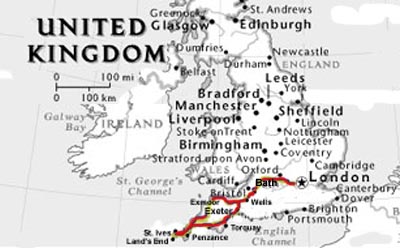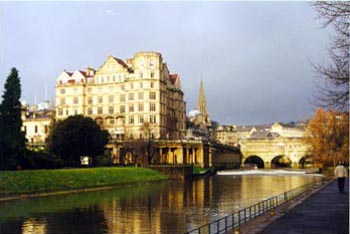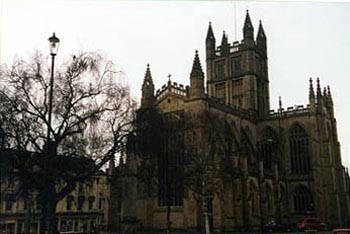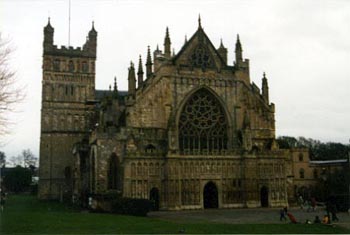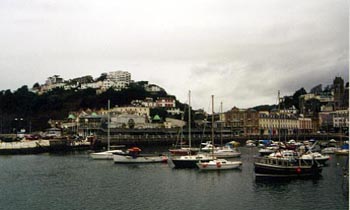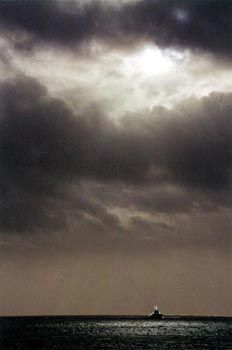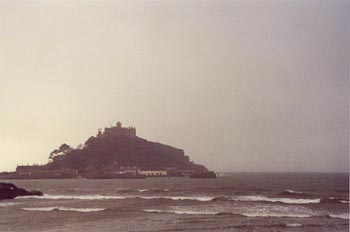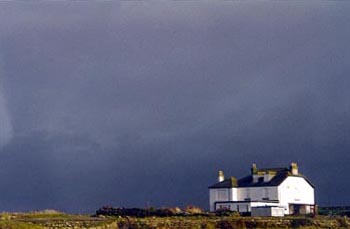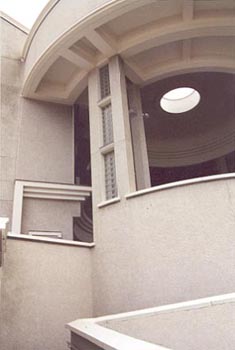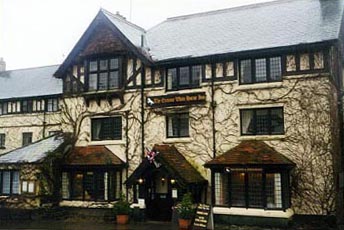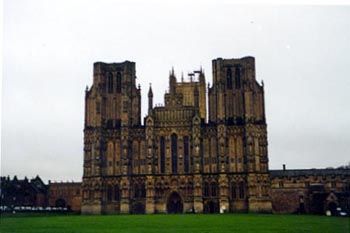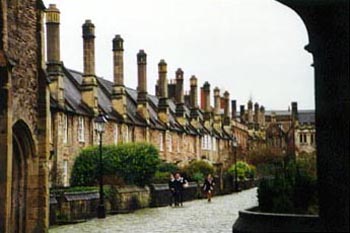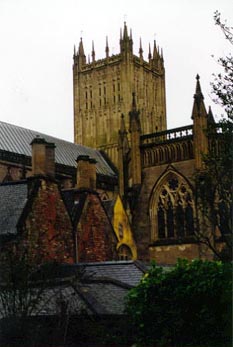
. . . LAND ROVER OVERLAND EXPEDITION
| Home | |
Machu
Pichu & El Misti 2000
|
|
VALUED SPONSOR |
|
So this is Civilization Traveling through
the southwest provinces. Finally got out of town at noon,
tough to get motivated on this lazy student exchange pace. Nailed
by the parking nazis, another ticket despite having fed the meter.
Sweet Mother of Pearl! Fought traffic through Kensington, missed
the Marble Arch underpass and got stuck watching the traffic circle
for five minutes as a penance. Locals confirm that just getting
out of town is such an ordeal that they just don't bother driving
anywhere. I suppose that's a blessing in disguise. No elevated freeways
with decaying graffiti-sprayed columns lurking over the downtown.
Make it hard on cars and people will take the train. "Well I'm not like you, I'm
a bit worried about the unknown. I can't just run off to a strange
country so easily" - said a friend on the phone the other day.
It's not really like that. Even driving out of town into the English
countryside, I have a feeling of dread about the locked horizon
and what is out there. World travel or no - its not the lack of
fear that leads me off into blank places on the map. The conversation
rolled around my head as I steered onto the wide three-lane M4 heading
west. I suppose restless curiosity is a spur, probably more than
for other people, and I just figure things will work out in the
end. As though it will all be ok. Is that fatalism I wonder, a sense
of pre-destination? Bath "Bath ranks as one of Britain's
top ten tourist cities, yet the place has never lost its exclusive
air. Bath owes its name and fame to its hot springs, the only ones
in the country, which made it a place of reverence for the local
Celtic population - though it had to wait for Roman technology to
create a fully fledged bathing establishment. The baths fell into
decline with the departure of the Romans, but the town later regained
its pre-eminence under the Saxons, its abbey seeing the coronation
of the first king of England, Edgar, in 973. A new Tudor bathing
complex was popularized by the visit of Elizabeth I in 1574, and
the city reached its fashionable zenith in the eighteenth century,
when Beau Nash ruled the town's social scene. It was at this time
that Bath acquired its ranks of Palladian mansions and town houses,
all of them built in the local Bath stone which is now enshrined
in building regulations as an obligatory element in any new constructions
in the city." (Britain, The Rough Guide) Walking through cities at night
has a particular charm. The shops are closed, and a town can seem
more honest without its commercial urgings. I strolled past the
Bath cathedral, around the Romanesque baths which give this town
its name. There is appeal in the history of the town, and the Georgian
townhouses are stately and imposing, but I walked past most sights
in 90 minutes and there was little incentive to find more minor
gems in the cold drizzly evening. Cafe Rouge deserves a special
mention. I passed this French bistro just after the Roman baths,
and returning at the end of my perambulations asked for a table
for the night. Despite the fact that I was a single diner, the manager
opened a reserved table, quite pleasantly seated me at the last
space, and attended promptly for the rest of the night as I killed
time avoiding the hostel. Evidently I'd picked an excellent spot
because he turned away a constant stream of people for the next
few hours, some of them quite well dressed and obviously capable
of spending a mint. I passed a knot of teens in the
deserted pedestrian-only streets, feeling like a cultural waif.
A common feeling for me when I ramble through another country as
an outsider looking in. It seemed odd that I understood their chatter.
My past trips had always been to non-English speaking countries.
Bath was still in a foreign country, so why was there an odd disconnect.
I couldn't put my finger on it. Vicarious Sex "Some jockeying around in
the starting gate, they're getting into position ... aaaand they're
OFF! Steady Sam into the lead running strong at the head of the
pack, heading down the front stretch, the filly moving well clearly
in fine form. Around the turn, getting a bit sloppy, he'll have
to be careful there, the track can be rough. Coming round the
back stretch, this is the critical finish. Oh no Bob, he's not
going to finish, he's off his timing. Oh a disappointing ending
from Steady Sam, he was running so well, just lost it on the back
stretch. Ah yes, she won't be happy with that performance Bob." Sure enough, in the post-coital
air there was a soft whisper from him, "Did you come"?
"Oh that's ok, next time", she answered. I grinned. Exeter, Torquay "Exeter's sights are richer
than those of any other town in Devon or Cornwall, the legacy of
an eventful history since its Celtic foundation and the establishment
of the most westerly Roman outpost. After the Roman withdrawal,
Exeter was refounded by Alfred the Great, and by the time of the
Norman Conquest had become one of the largest towns in England,
profiting from its position on the banks of the River Exe. The expansion
of the wool trade in the Tudor period sustained the city until the
eighteenth century, and Exeter has maintained its status as a commercial
center and country town, despite having much of its ancient center
gutted by World War II bombing." (Britain, The Rough
Guide) Winding through the maze of streets
(following the ubiquitous brown Town Center signs) I missed the
Cathedral turnoff, ending up at the harbor. Not much commercial
trade anymore, but the whole area has been converted to eateries,
shoppes, and river views. I scooped half my gravy soaked roast lamb
into my lap at lunch, and had to run to the bathroom to run cold
water on my white wool sweater. I'm sure the staff was amused -
I blamed it on lack of sleep. A long set of stairs winds up from
the harbor into the town center, and with the low perspective there
is no notice of the grandeur of the cathedral until you round the
corner into the courtyard. The gray weather does not do the church
any justice in this picture, but the contrast between the great
Norman towers flanking the nave with the gothic architecture is
stunning. The church boasts the longest unbroken gothic ceiling
in the world. The streets surrounding the area a cluttered with
shops and pubs, though old city is only a few blocks in size. In
the words of one guide, "the rest of the downtown was built
in the post-war architectural school of 'for goodness sake just
get something put up'". Leaving Exeter on the A380, again heading southwest
parallel to the coast, I made for Torquay - described as the center
of the English Riviera. Having visited the French and Italian rivieras
I was skeptical, but driving along the seaside I could see the resemblance.
Narrow pebbled beaches with occasional spits of sand were hemmed
in with manicured roadside verges dotted with palms (actually New
Zealand cabbage trees capable of thriving in the English cool).
This was also the fictional home of Basil Fawlty, the comic hotelier
played to perfection by Cleese of Monty Python fame. The harbor
is fronted by a row of stores and amusements, a museum, a marina,
and the requisite pubs - mostly deserted in the off season. Though
the town could have secreted other charms, the spitting weather
didn't encourage exploration - so I saddled back up for Penzance. Penzance Ok, a legitimate nod to Carnson House for such friendly
service and a free breakfast. I quartered through Penzance with
the car, speed sightseeing, to make up some of the time spent on
a lazy sleep in. Like most English towns, the layout is a crazy
maze of streets with one slightly wider route tagged with the highway
number. The harbor sheltered a small fishing fleet and small hotels
and B&Bs faced the sea along the wide curve of the bay. Not
really much to see in the town - but five minutes drive away is
a rather famous attraction - an ancient Celtic monastery only a
accessible at low tide. "St. Michaels' Mount can be seen a couple hundred
yards offshore. A vision of the archangel Michael led to the building
of a church on this granite pile around the fifth century, and within
three centuries a Celtic monastery had been founded here. The present
building derives from a chapel raised in the eleventh century by
Edward the Confessor, who handed over the chapel to the Benedictine
monks of Brittany's Mont St Michel, whose island abbey was the model
for this one. At low tide, the promontory can be approached via
a cobbled causeway; at high tide there are boats." (Britain,
The Rough Guide) The observation parks along the sea were deserted
in the off season and the island was swathed in driving rain, high
tide obscuring the causeway. After a few snaps, I retreated to the
car and looked for a closer view in town. Maybe the gate was not
closed because it was the off season, or possibly most English drivers
have more sense - but as I turned onto a cobbled narrow road that
seemed to promise an excellent view, I was shocked to see through
the driving rain that it disappeared down into the ocean a dozen
meters away! Evidently it was the causeway to the island, now submerged
under high tide. Nothing like a bit of drama to settle breakfast. Land's End, St. Ives 'As I was walking to St. Ives I
met a man with seven wives. Each wife had seven sacks, each sack
had seven cats, each cat had seven kits. Kits, cats, sacks, and
wives - how many were going to St. Ives?' I knew the answer to the
riddle but was curious about the town. In the early years of the
century the former fishing village was beginning to attract a vibrant
artists' colony, which culminated in the 60's. Hmmm, artists, the
seven wives thing was starting to make sense. The artistic heritage
of the town was solidified with the building of the beautiful Tate
Gallery, overlooking the rolling waves and surfers of Porthemeor
Beach. Specializing in modern art and some sculpture, I found the
most appealing feature to be the gallery itself (and the coffee
served from the top floor with the best view in the town). Low on time now, I headed toward
home, steering onto the A30 a direct shot back northeast. Cornwall,
the province at England's southwest tip, is renowned for the beauty
of the countryside. Cooped up in the car, I reflected on the winding
lanes I'd driven - stone houses, green, sheep filled meadows, narrow
winding roads, occasional reversing, tight hairpin turns. My mind
wound back to the odd cultural impression I'd had in Bath. What
was it that nagged at me? Exmoor's desolate
heath "A high bare plateau sliced
by wooded combes and splashing rivers, Exmoor can be one of the
most forbidding landscapes in England, especially when the sea mist
descends. When it's clear, though, the moorland of this national
park reveals rich swathes of color and an amazing diversity of wildlife,
from buzzards to the short and stocky Exmoor ponies, a species closely
related to prehistoric horses. In the treeless heartland of the
moor around Simonsbath, stands Exmoor Forest, scarcely populated
except by roaming sheep and a few red deer. The word 'forest' denotes
simply that it was a hunting reserve. In the middle of it stands
the village of Simonsbath, home to the Knight family who bought
the forest in 1818 and by introducing tenant farmers, building roads,
and importing sheep, brought systematic agriculture to an area that
had never before produced any income." (Britain, The
Rough Guide) The forbidding emptiness of the
area automatically slowed me, an accident out here would mean a
cold night alone, no traffic in sight and no town lights anywhere.
Turning left at the little hamlet of Simonsbath, I continued thoughtfully
across the moor. A gentle sweep down into a hollow preceded a quick
turn onto a stone bridge over the Exe river at Exford. To the left,
a warmly lit inn. I'd had enough of traveling, the proprietor offered
a discount (always ask) so I stayed in a beautiful room, well furnished
by any standard, accommodation, dinner, and full English breakfast
for �50. Huddled in the bar, scratching out
this journal on my Palm Pilot, I glanced around, the place was chock
a block with old couples. In the bathroom I saw the familiar prophylactic
dispenser and had to chuckle, most of the options were for Anacin,
Tylenol, or Asprin. These were sprightly folks though - some hikers,
some drivers. The courtyard was a convention of 4x4s. This could
be an great base to hike the moor. Calendars of the moor, "view
a real hunt - by Land Rover" brochures, maps of the moor (only
�2), the Inn did its best to capture all the available revenue -
as an entrepreneur I approved. Nice work. Dinner was lovely, though
my age really came into contrast by that point. Across the room
a white haired gentleman was grilling the table opposite, "so
how old do you think I am then? born in '24, what, what! served
in the big one..." The ladies beside me leaned over, "quite
silly really, we can't reserve the same table for our entire stay,
don't you think?" The Home of Civilization? Wells and
home I wandered around the cathedral,
there is no way to present in a photograph the splendor of the church.
Not only the central span, but the long extensions of houses, buildings,
and park. Even the Bishop's Palace is impressive - "the place
was walled and moated as a result of a rift with the borough in
the fourteenth century, and the imposing gatehouse still displays
the grooves of the portcullis and a chute for pouring oil and molten
lead on would-be assailants." On the north side of the church,
the row of houses are mainly seventeenth and eighteenth century,
and house the Wells Cathedral Academy - a prestigious school of
music whose choir performs regularly in the cathedral. After tea and a cucumber sandwich in a wee restaurant
facing the cathedral square - I saddled up again for home. The western country is indeed beautiful. The most
vivid impressions are of the unending green - I can see why green
lawns became a religion in the colonies - the sheep dotted pastures
and sturdy stone walls evoke a sense of permanence. This country
has been tended for centuries and there are few abandoned corners,
everything has been tamed and carefully husbanded. Yet the land
does not feel tamed. Ever present rain sweeping off an unpredictable
ocean, and the strong connection to the sea that is only minutes
away in almost every direction, shadows the neat landscape. I would
love to come back for a week of hiking on a few of the myriad marked
trails. To walk through the moor for the day and relax in a country
inn like the White Horse at night - that would be a real treat! Three hours of highway funneled back into London,
and I dropped by the apartment at Covent Garden to drop off my luggage
before returning the rental car. Thought about turning on the hazards
since I was illegally parked - but figured I'd just run up quickly
and be back on my way. In the two minutes it took to run up and
down I was nailed by the ticket nazis again. Well even silver clouds
must have dark linings. |
All rights reserved
